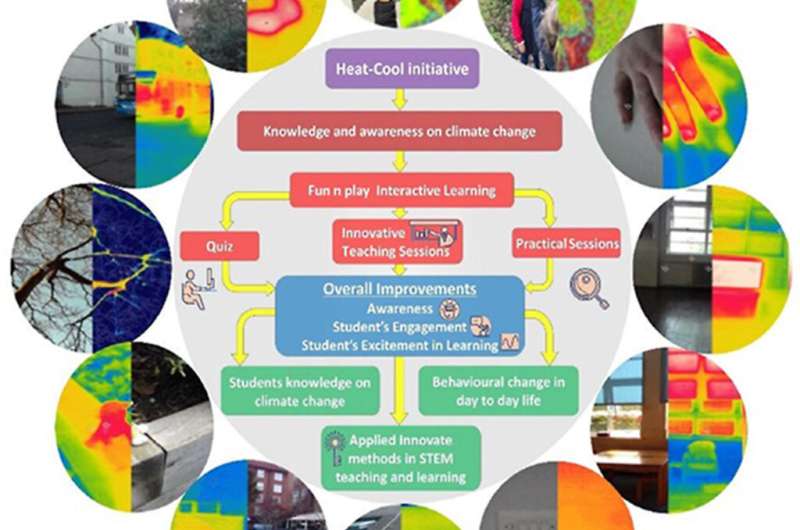This article has been reviewed according to Science X's editorial process and policies. Editors have highlighted the following attributes while ensuring the content's credibility:
fact-checked
trusted source
proofread
Fun climate change education programs could boost interest in STEM subjects

Make climate change education technology-based and fun from the offset to help reverse the declining interest in Science, Technology, Engineering, and Mathematics (STEM) subjects, say the authors of a new study from the University of Surrey.
Researchers from Surrey's Global Centre for Clean Air Research (GCARE) developed 'Heat-Cool'—a technology-enhanced learning program that increased climate change literacy among 79% of primary school students and 62% of secondary school students.
Heat-Cool encouraged pupils to use infrared cameras to explore and learn about the urban heat island—a phenomenon where urban built-up areas lacking green spaces experience higher temperatures than the surrounding rural areas.
Professor Prashant Kumar, lead author of the study, the founding Director of GCARE and the Co-Director of the Institute for Sustainability at the University of Surrey, said,
"Arming our children with the necessary knowledge and skills to understand and eventually help fight climate change is critical to nursing our planet back to health. Our study suggests that a playful and interactive education program such as Heat-Cool is not only fun for our children, but it generates an interest in climate change and, importantly, it also stimulates an interest in STEM subjects."
The study monitored the learning outcomes of 103 students from two cohorts (years 5-6 and 7-9) who participated in five Heat-Cool activity sessions. The pupils' climate change literacy was assessed through quizzes before and after the sessions. Knowledge on climate change increased by 9.4% in primary school children and by 4.5% in secondary school children.
In the sessions, the pupils took more than 2,000 infrared images, which the researchers categorized into 13 common themes. Interestingly, primary school children tended to create selfie images, while secondary school pupils were more engaged with their physical environment.
Co-author Associate Professor Sebastian Pfautsch from Western Sydney University in Australia, said, "It is great to see the positive effect of our climate change education program. Every child should have access to it, empowering them to become earth stewards."
The study is published in the journal Renewable and Sustainable Energy Reviews.
More information: Prashant Kumar et al, Using empirical science education in schools to improve climate change literacy, Renewable and Sustainable Energy Reviews (2023). DOI: 10.1016/j.rser.2023.113232
Provided by University of Surrey





















